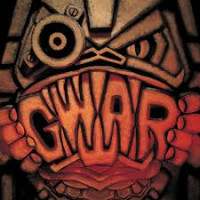Paradoxically, 1999’s We Kill Everything might have been the album that saved GWAR. Released during the era where every CD was crammed to nearly the 80 minute mark whether they needed it or not (most didn’t), the album is historically seen as the band’s nadir. Hell, even when it was released, it wasn’t celebrated for its accomplishments so much as it was for its overt goofiness.
While the late ‘80s and early ‘90s had been a boom for GWAR, the band’s mid-period, which began with the competent, if somewhat unremarkable This Toilet Earth, found them struggling. Their rising success had begun to level out and they reached the first plateau with what they were able to do with the GWAR concept. They had fought censorship. They had ridiculed the human condition. They had attacked religion. They had bathed the audience in blood and crud and mud and cum. By the late ‘90s, the band had begun to experiment with random exercises such as ska tracks (“Saddam A Go-Go”), nightclub crooners (“Don’t Need a Man”), and even white boy rap (“Think You Outta Know This”). As the band admits in their excellent autobiography, Let There Be GWAR that was the result of wanting to branch out as much as it was a lack of organization and direction.
We Kill... exhibited exactly that. At a full 17 tracks, the album found the band hop scotching from style to style. “Fishfuck” was straight up Epifat pop-punk. “Fuckin’ An Animal” was a clompy sing-a-long. “The Performer” ridiculed the Joel/John piano ballad. Songs like “Escape from Mooselodge” and “Jiggle the Handle” verged on prog-experimentation.
To wit, the only connective tissue between these songs was an overt comedy angle. GWAR has always had yuks in their songs but, here, it seemed for the first time the band decided to take a funny line or idea and then build a sing around it, rather than the other way around. Even the new characters- a talking toilet, a prophet that had balls for his chin- seemed to bexist merely to be ridiculous.
At the time, what GWAR forgot was that GWAR is funny in and of itself. GWAR doing anything at all is hilarious – see the video of them trick or treating – so to compound the inherent comedy/absurdity of GWAR with forced jokes served to water down the band’s whole angle. They might have been able to get around it if the songs were as good as the earlier (or later) eras, but with most of these tracks, once the initial joke wore off, the songs could not support themselves.
The recordings weren’t a total waste. “Jagermonster” still rips and the opening tunes, which blast by in three minutes or less, are fist pumpers and rock without getting stale. Still, the extended middle section, which was overly concerned with detailing a complicated plot, as supported by the band’s less striking songs, weighed down the release and made it something of a slog by the mid-portion. GWAR may have been hungry at this point, but they were aimless.
A few years later, GWAR’s Dave Brockie seemed to blame the whole band on this (including himself), arguing that he didn’t have enough control over the direction and the people that were contributing didn’t really want to make a GWAR album. By contrast, in Let there be GWAR the band members of the time seem to blame Brockie as a reason the album failed, noting that We Kill... songs are the closest the band ever came to Brockie’s comedy/absurd pop-punk side project DBX.
But, the blame game wasn’t important here. It seems that after the album was released to lackluster sales and so-so critical review, the band realized they were in dire straits. Ironically, the end of GWAR, as joked about on the We Kill... album, may have actually been on the horizon. Realizing that they were in critical condition, Brockie and a few of the other drivers behind GWAR rejiggered the band. Some staff were let go, and the main drivers each took a firmer hand in crafting the “comeback album” Violence Has Arrived. With VHA, the band was once a gain a serious, ripping heavy metal band, despite the fact that they were still hilarious.
Had WKE been an unremarkable, but solid album along the lines of This Toilet Earth or, to a lesser extent, Ragnarok, the band may have just stayed the course and slipped into a slow decline, eventually to peter out. Luckily, the failure of WKE was the message and kick in the ass the band needed to usher in their new golden millennium, which, arguably, was their best material they ever released. For that alone, WKE should be heralded.
